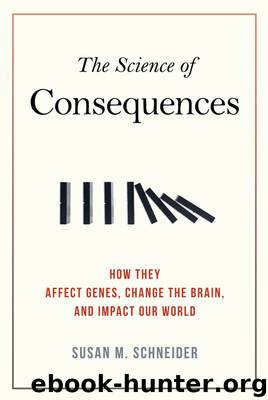The Science of Consequences: How They Affect Genes, Change the Brain, and Impact Our World by Susan M. Schneider

Author:Susan M. Schneider
Language: eng
Format: mobi
Tags: General Fiction
Publisher: Prometheus Books
Published: 2012-12-10T14:00:00+00:00
While serious practice brings progress toward a goal, it’s seldom noticeable enough to be intrinsically reinforcing. How do budding experts acquire the motivation to persevere? According to Ericsson’s research, they get it from the prospect of long-term rewards like fame and fortune; short-term rewards like performances, contests, and praise; and progressive schedules with gradually increasing practice time, which develops the ability to handle lean schedules of reinforcement with long delays (see chapter 5).33 Like the kids with the marshmallows (see chapter 12), they exercise self-control, but the marshmallows are a lot bigger. Bloom came to similar conclusions, noting in addition a role for the positives-to-negatives ratio when discussing the deeds of the teachers of these experts when they were young children: “These teachers gave much positive reinforcement and only rarely were they critical of the child. However, they did set standards and expected the child to make progress, although this was largely done with approval and praise.”34
One of my favorite quotes on maximizing potential is from David Shenk’s book, The Genius in All of Us: “Everyone is born with differences, and some with unique advantages for certain tasks. But no one is genetically designed into greatness and few are biologically restricted from attaining it.”35 Another is from Malcom Gladwell’s Outliers: “To build a better world we need to replace the patchwork of lucky breaks and arbitrary advantages that today determine success . . . with a society that provides opportunities for all. . . . The world could be so much richer than the world we have settled for.”36 Evidence-based education is attempting to do just that.
SUCCESSFUL PROGRAMS
Bloom promoted teaching to mastery before having students move on, and some mastery-based programs have achieved notable success even with heavily disadvantaged students. Perhaps foremost among them is the winner of the largest educational experiment ever run, Project Follow Through. Because many kids leaving Head Start preschool programs in the 1960s soon lost the gains they had made, the US Department of Education sponsored the project, which involved hundreds of thousands of elementary students across the nation. Parents chose one of the available teaching models for their school, and then a comparison school was selected in that area. Twelve different programs competed, and all students received the same thorough testing afterward. Developers of all programs agreed on the need for critical thinking—the ability to understand and apply higher-order concepts, not just memorize facts.37
The winning Direct Instruction program relies on carefully designed materials with steps that are neither too large nor too small, and multiple examples for better generalization. Its features include teacher modeling of skills; a great deal of active student participation; learning to mastery; constant adjustment to student success or failure; and consequences including immediate feedback, praise, and natural rewards. (Some sort of positive reinforcement was, of course, part of all the programs, but it was a focus in Direct Instruction, and a high positives-to-negatives ratio was built in.) The final evaluation showed that, compared to students in the comparison schools, Direct
Download
This site does not store any files on its server. We only index and link to content provided by other sites. Please contact the content providers to delete copyright contents if any and email us, we'll remove relevant links or contents immediately.
The Art of Thinking Clearly by Rolf Dobelli(10455)
Mindhunter: Inside the FBI's Elite Serial Crime Unit by John E. Douglas & Mark Olshaker(9324)
Change Your Questions, Change Your Life by Marilee Adams(7760)
Nudge - Improving Decisions about Health, Wealth, and Happiness by Thaler Sunstein(7693)
Mastermind: How to Think Like Sherlock Holmes by Maria Konnikova(7323)
The Power of Now: A Guide to Spiritual Enlightenment by Eckhart Tolle(5755)
Men In Love by Nancy Friday(5234)
Altered Sensations by David Pantalony(5094)
Factfulness: Ten Reasons We're Wrong About the World – and Why Things Are Better Than You Think by Hans Rosling(4734)
The Confidence Code by Katty Kay(4251)
Thinking in Bets by Annie Duke(4218)
Man and His Symbols by Carl Gustav Jung(4131)
The Worm at the Core by Sheldon Solomon(3486)
Why Buddhism is True by Robert Wright(3446)
Liar's Poker by Michael Lewis(3441)
Three Women by Lisa Taddeo(3424)
The Inner Life of Animals by Peter Wohlleben(3310)
Descartes' Error by Antonio Damasio(3270)
How Music Works by David Byrne(3259)
